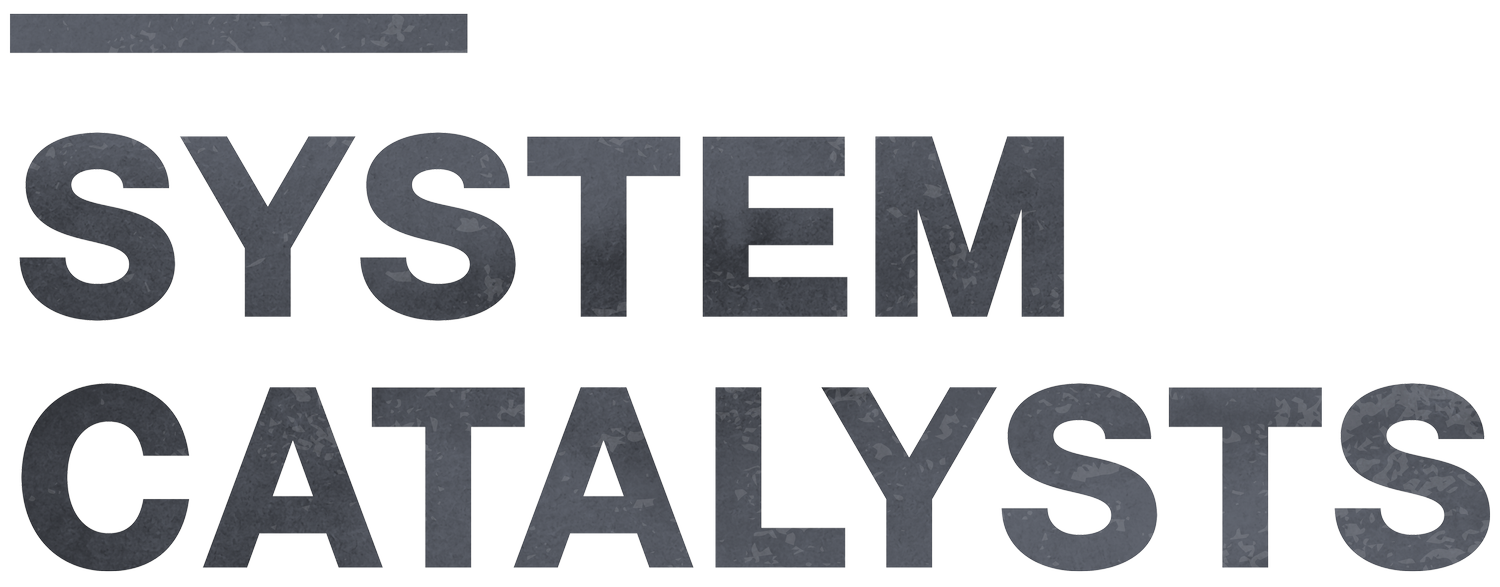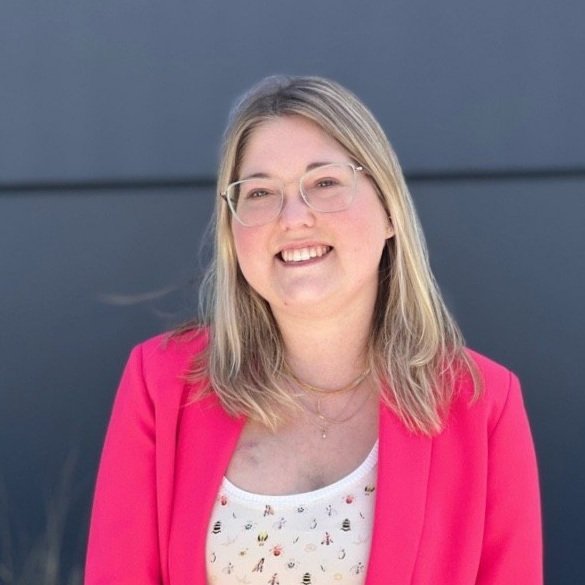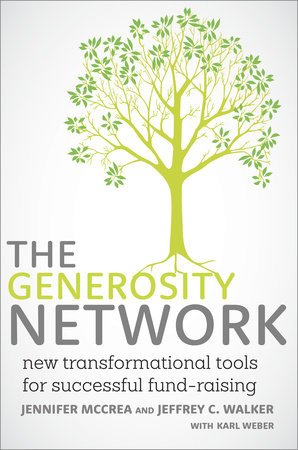
the future of partnerships between (big) donors and organizations.
episode 29:
You bring money to the table, and you're glad to do it. But if we're being honest here, you want to be seen as more than a pocket book.
And the "Warren Buffet" model of philanthropy has always left you feeling a little cold.
You want partnerships.
'Bring everything we've got to solve big problems' kind of partnerships.
'Together we can solve this' kind of partnerships.
Listen to U.S. Philanthropists Jeff Walker and English Sall talk about the future of donor partnerships...
f you aspire to be a System Catalyst and need resources to help you on your journey, subscribe to our newsletter.
Learn more about our mission and our partners, visit systemcatalysts.com.
This podcast is produced by Hueman Group Media.
-
What Donors Need to Know
Featuring Jeff Walker and English Sall
English: [00:00:02] Hey there changemakers. Welcome back to System Catalyst. We've got something special for you today. Instead of interviewing a guest. Jeff and I are going to have a conversation, just the two of us, about a really important topic. Donors. [00:00:18][15.9]
Jeff: [00:00:19] That's right. English and I are donors ourselves. And let's be real, we're not perfect. But over the years, we've learned a thing or two, especially this. Donors need to give less orders from their office and instead listen and collaborate with the people they fund. [00:00:33][13.8]
English: [00:00:34] Some people call this trust based philanthropy. You might have heard of it already, but despite all the chatter, it's not something you see every day. So today we'll talk about how donors and system catalysts can become true partners. [00:00:49][14.6]
Jeff: [00:00:50] So whether you're a philanthropist or a system catalyst looking for funding, we think you'll learn a lot from this conversation. [00:00:56][5.5]
English: [00:01:01] I was sitting on this panel at Harvard Business. I was asked a question by. It was a group of social entrepreneurs and a very smart, wise entrepreneur. We are talking about philanthropy, and we were talking about stewards of resources and giving money. And this this entrepreneur asked a question. She's like, you know, I'm I'm nervous asking this question, given who is on the panel. She said, I have a really hard time with trust based philanthropy. It feels like it's something that people talk about a lot, but I have yet to actually see it in operation. And I want to get like a donors perspective on that. And quite honestly, we were all kind of like, yeah, it's rare. I don't I think that we all talked about it and I think that it didn't. A lot of letters on, you know, it, it exists a lot in the intent, but I think that it's hard to find. [00:02:00][59.1]
Jeff: [00:02:01] What is trust based philanthropy in your mind because I have a view on it, but I'm not sure it's the same. [00:02:05][3.8]
English: [00:02:06] I think that that's like one of the hardest things that I feel like I struggle with personally is that trust. With whom? Right? Is it the donor trusting the grantee? Is it the grantee trusting the donor? I think it has to be both for it to work. And I think that that in a lot of ways, when we talk about this idea of a system catalyst, in order for it to work well, it only can exist on trust, because this idea of changing a system, there's a lot of ambiguity to it. There's not a direct service model involved. There's not an easy way to measure outcomes or an easy way to say, this is where the money is going, and this is what the money is doing, because some of it is just like we're learning as we're growing and we're learning as we're doing. And so I think it has to be collaborative and it has to be trust based. But then there's sometimes too, even with me, where I think about, oh, I'm not doing this as well as I should be. [00:03:04][58.1]
Jeff: [00:03:05] See, to me English, you are by example, someone who develops close partnerships with those that are doers and you as a donor, partner and donor probably is too restrictive of a term. But someone who learns and listens along with the other individual. And it has that trusting relationship. But it's not just some people define trust. Philanthropy is the donors. Just give me money and trust me, I'm going to do a good job. And to me, that's not the deal. Yeah, I think that's actually too one sided. Just treating people like a pocketbook. So how do you lower that wall between the donors and doers and decide? I'm finding ways for that donor to actually feel like they're contributing more than money, and that they're actually opening a network to me to enhance my success, and that they're learning a whole lot along the way from other people they're partnering with, whether it's other donors or other governments or multilateral or academics or whatever it might be, but they're growing along with us and learning along the way. So when you do have to change or shift, you do it together. That, to me, is the trust. You know, it's not okay. It's all going to be people who are proximate to the problem, making all the decisions, and donors don't know anything. I think that's a different point. I do think there are a whole lot of donors that think they know a whole lot about what they're putting money into, and because they have money, they have the power, and they're going to decide how to allocate out that money so that people will present to them and bow down to them almost before the then the donor decides who gets it. To me, that's not the deal. [00:04:50][105.4]
English: [00:04:52] I think the most enjoyable situations that I've ever been in, right, have been where I'm usually the one that is actually like I can bring resources to the table, but as far as knowledge, experience and kind of learnings, I have found the situations where I most enjoy are the ones where I am like the least knowledgeable in the room. And I appreciate that so much, because I really love being surrounded by people who feel steadfast and confident in the problem that they're trying to solve, and understand and know what needs to be done to solve that problem. And I think that that's sometimes what, in my mind, is so unique and interesting about funding a system catalyst and working in this situation of a system is that like I learn more by being a participant in that, learning of how to change that system, but I by all means, I'm not the only voice there or I'm not the only expert there. And so it's just it's an open ended question of like, how do we how do we embark on that as a learning experience versus a power grabbing experience? [00:06:03][71.2]
Jeff: [00:06:04] Absolutely. I mean, isn't that the relationship that we have with the chat team with Wendy and Raquel in saying we're co-creating with each other and you and I and Austin Hearst spends time working on maternal health in new Jersey on our calls every two weeks. We're on sharing knowledge, and we're all just talking about update and what we're doing, and there's a full time team working on it and bringing people together. And it's exciting, actually, and accomplishing a whole lot. You know, I think there's people out there like Warren Buffett who have said very explicitly that they don't know anything about the philanthropic world, and therefore they're going to give money to other people to do it, because those are the professionals that he's really good at making money in the for profit side. And that's fine for him. But that's not the way I do it. And I know that's not the way you do it. And so I think there are definitely skills that we've learned in our other worlds with his for profit or you on the Board of Care and large and CEOs or us working in multilateral or US working just in general teams that we bring to the table. And I think it's better because you're starting to integrate these kinds of experiences, whether it's for profit experience, political experience, academic experience to solve a problem. And it's not just a philanthropic problem. It's not just a problem with those people over in the philanthropic side or those specialists that understand malaria and or the government officials that have medical backgrounds, I think they're not going to solve the problem more likely, unless they connect and contribute along with people who have other experiences. And that's, to me, is the beauty of the system catalyst, who tries to bring those together. And that's what Ray chambers did in malaria and lowering a million deaths a year in Africa by bringing a whole team together and multiple stakeholders together for the common problem. [00:08:10][126.4]
English: [00:08:12] So roll with me for a second. Let's play this out because it is all great when it works. Right. And I think some of the situations that we have even found ourselves in or that in, you know, the context that I found myself in and in other scenarios is like, what about when it's not? What about when there's differing opinions between that team, the grantees, and the donors? Because of the fact that we all think that we have important knowledge to bear? I think it's just it's one of those scenarios where it's like, okay, what if what if that team came to us and said, we actually have a completely different model in mind that we want to test out? How would we respond or how have we responded in the past? [00:08:54][42.8]
Jeff: [00:08:55] Yeah. When I had a, you know, my partnership in private equity, we did not do a deal unless there was consensus across all the partners. Didn't matter. And why can't you operate like that in this circumstance as well? If there's those hard opinions, then maybe it shouldn't go forward, whatever that is. And if there they're minor differences, you're going to compromise. And if it's someone who says, I have a completely different view and it's really material, then that probably shouldn't be a partner and I probably shouldn't be part of the organization. So to me, that's the screening opportunity saying, how do we bring in people who are partners, who have yeah, I really understanding of the problem and that we're just trying to explore ways to solve the problem in lots of different ways to do that. [00:09:46][50.6]
English: [00:09:55] I think just the dynamic in general of those with resources and those who want those resources to make change, especially as we're talking about the system catalyst space is just it's such a unique and complex relationship. And I think you're right. I think it exists beyond philanthropy. Right. I'm a tech entrepreneur, exist in the investment world. It exists. And a lot of other spaces, you know, that have that asymmetrical power. You know, I've been having, you know, conversations with just different people in this space. Stephanie Kimball, we've interviewed on the podcast before, and one of my dear friends, Danielle Thomas, as well. And we were talking the other day about the different types of power that exist. Right. So there's coercive power, there's reward power, there's legitimate power. And then there's like, what is it called? I think it's like connection power or community power or referent power. And we were talking about the type of power that is at play a lot in the philanthropic space. And I think that the type of power that we are trying to bring about and elevate, especially when it comes to this idea of changing a system or being in community with someone who has a system. Catalyst is a lot more around this sort of community, this connection power, this idea that there is something that the catalyst is bringing to the table. There's something that all the partners involved are bringing to the table, and there's something that the resource holder is bringing to the table. And all of that should feel like kind of everybody's playing their part, like we're in collaboration together and there's no differential in sort of what value is associated with what these people are bringing to the table. I think sometimes we see more in this space, because there's an asymmetric kind of use of resources, is more of the coercive power or the reward power, right. If you don't do X, something bad will happen. You will lose funding. If you do do this, you will gain funding. And I'm just curious to, you know, unpack a little bit about how what we've done and what we've seen is trying to push against that. [00:12:06][131.2]
Jeff: [00:12:07] But to me is it's many times business types will walk in and say, I'm applying the same model I did to start up a company and grow it and take it public. And I remember Goldman did this in the philanthropic space. They were putting together business plan offerings. And so it was like an IPO. And they sent it out and saying, fund us. It's a new charter school. It's a great idea giving money. And then we'll give you a report periodically as to how it's doing. But trust us, we've viewed it and it's all a good thing. To me. That's just not what the system catalytic operations are. And the most fun and interesting operations are for donors. That's a very cold. I'll give you money, you'll give me reports, and periodically you'll tell me what's going on. Some universities do that. In fact, a lot of times universities do that because, you know, they want they have that donor relationship. What we're talking about is full walls down. You're coming in with me and partnering with me and it if it's a problem, it's our problem, not my problem, not your problem. It's our problem. And we're going to figure out how to solve it together. And so rather than that calls third party relationship. It's a relationship that says I have lots of resources. It might be money, it might be network, it might be industry knowledge, it might be ability to bring in other partners as well. It might be management, leadership kind of experience, whatever that might be. It might be finance experience. Like for me, it might be technology experiences like it is for you. And that we're going to bring that to the table along with everything else that the system catalogs have to help solve the problem. And let's bring in other priorities along the way. So understanding that there's a different model here that is not the I'm going to raise a fund that's going to be doing good. And therefore then I'll announce it. And it how have all these different NGOs apply. And I'll decide which ones are going to be the ones that are important. And I'll report to each one of those. That's happening all the time. You and I see it. And maybe that's okay because that gets money to those NGOs. But I think that's going to be less effective in solving the problems. [00:14:13][126.1]
English: [00:14:23] The process, and the way in which you lay that out makes a lot of sense, and I think it's taken us a long time to move and transition, even our mindset to this possibility of this future world of like, this is how it could work. This is how stewarding of resources could work in collaboration with stakeholders, with partners, with people who are really bringing so much of their passion and time and expertise to the table. We could be in partnership with them. How do we actually come to these things with, you know, a checked ego, with realizing that we can't claim attribution over a systems change effort, realizing it's about contribution, and realizing also that the people that we have asked to come to the table and sit with us are absolutely experts. They are valuable in their own right of being able to shape the project themselves. Right. And so that's how we have chosen to collaborate. As donors. But what do you think that donors are afraid of? Who say, no, that's not for me. Like, I don't know if I want to do that. What do you think is going through their mind when they're when they're approached with that opportunity and they're like, I would actually rather just give to maybe a brick and mortar organization. [00:15:43][80.8]
Jeff: [00:15:45] Well, what they're many times afraid of is they're being treated like a checkbook. Therefore, they have to treat the other side like an investment. Or they're afraid of failing because if they don't follow the standard process, people are going to point to them saying you are stupid. And people have done that. You know, with Zuckerberg funding the Newark school program. You know, he was pointed to is saying $250 million was put down whole, you know, because it didn't succeed, because they took a top down strategy. So there's an ongoing well, we won't do that again. And so it made them averse. So they get burned or there is somebody else behind them. That's their board. Or as the rest of their family who are saying you're accountable for whatever happens. So you can be the partner all you want, but you know, hey, you're the one that has to own this because you're the one that ask for the money. So there's a lot of fears out there. You know, a lot of times we don't understand as donors that there's a lot of fears on the other side as well from the social entrepreneurs. It's like, well, if I don't if I make them mad, they're not going to do this, you know, are that going to help support me? And I have to compromise myself or I don't want to compromise myself to these guys who just got money. They don't really get it. They'll understand it. So there's lots of fears. And to me, for example, at New Profit, what we did to get people to say, hey, system change is a good thing. It's really interesting to kind of look at is show them examples. We have brought Wendy Kopp, literally, she's on her board and talk about what are you doing? How is this occurring? And it took a while for them to even say, hey, you know, okay, I'm backing a system entrepreneur. What is this thing called, a system catalyst that isn't directly responsible for the specific things that I can measure, like number of schools at a charter school. But they started to see the stories. And that's why we're doing this podcast, is to tell those stories of success models. Until people, though, really feel it and taste it, they don't really own it. [00:17:44][118.8]
English: [00:17:44] Yeah, I think that that's exactly right. And so let's not be timid about those fears, right? Let's be very truthful and transparent about it. Like, hey, I'm worried sometimes as a donor that my involvement with this ends at how much money or the amount of money that I can bring to the table, when in reality I want to be a partner with you. I want to be in this. I want to help solve the problem almost regardless of my contribution. And sometimes that works and sometimes that doesn't. And I understand that. But I think that that's a real fear that we should talk about and that we should articulate, especially with people who are stewarding resources too. Right. I think that on the other side, I think it's very important for these grantees also to hold funders accountable with respect to their dollars and how they participate with their dollars. Right, because that's another kind of moment in time to think, hey, maybe it's not about your participation, but maybe sometimes it's about the way you're participating because you're, you know, we don't want to be overbearing. We don't want to be over decisive or dictate if we want to be in true partnership. And it takes a lot of transparency and trust from both sides to have those very real conversations. We're all new and we're all figuring it out, and how can we take that approach and really help calm that risk aversion and calm that fear that a lot of people have, of embarking on something that is new, that has a really intense complexity horizon. Like we don't have all the answers, and let's be honest about that. And then let's try to say, hey, this is now our problem to solve, not your problem to solve, and then report it to me or my problem to solve through my resources. That's it for today's show. Please don't forget to subscribe to System Catalysts so you don't miss out on a new episode. Also, do us a huge favor by rating our podcasts and leaving us a review. Thank you all so much for joining us, and we'll catch you all in the next episode. [00:20:02][137.3]
Jeff: [00:20:03] Before we go, I'd like to thank our producers at human Group media. We'd also like to thank our incredible network of partners who are supporting our mission the School Foundation, the Aspen Institute's Aspen Global Leadership Network, Echo and Green Dark Foundation, Maverick Collective, Virgin Unite. She released their own Africa outreach project, Boldly Go! Philanthropy. Same goes for Global Nexus and New Profit. If you're interested in becoming a system catalyst, you'll like to learn more about our partners. Please visit System catalyst.com. [00:20:03][0.0]
[1161.2]
Jeff Walker
Co-host, System Catalysts
Episode Guest:
English Sall
Co-host, System Catalysts
The Generosity Network by Jennifer McCrea, Jeffrey C. Walker and Karl Weber
The Generosity Network is the essential guide to the art of activating resources of every kind behind any worthy cause. Philanthropist Jeff Walker and fund-raising expert Jennifer McCrea offer a fresh new perspective that can make the toughest challenges of nonprofit management and development less stressful, more rewarding—and even fun.









